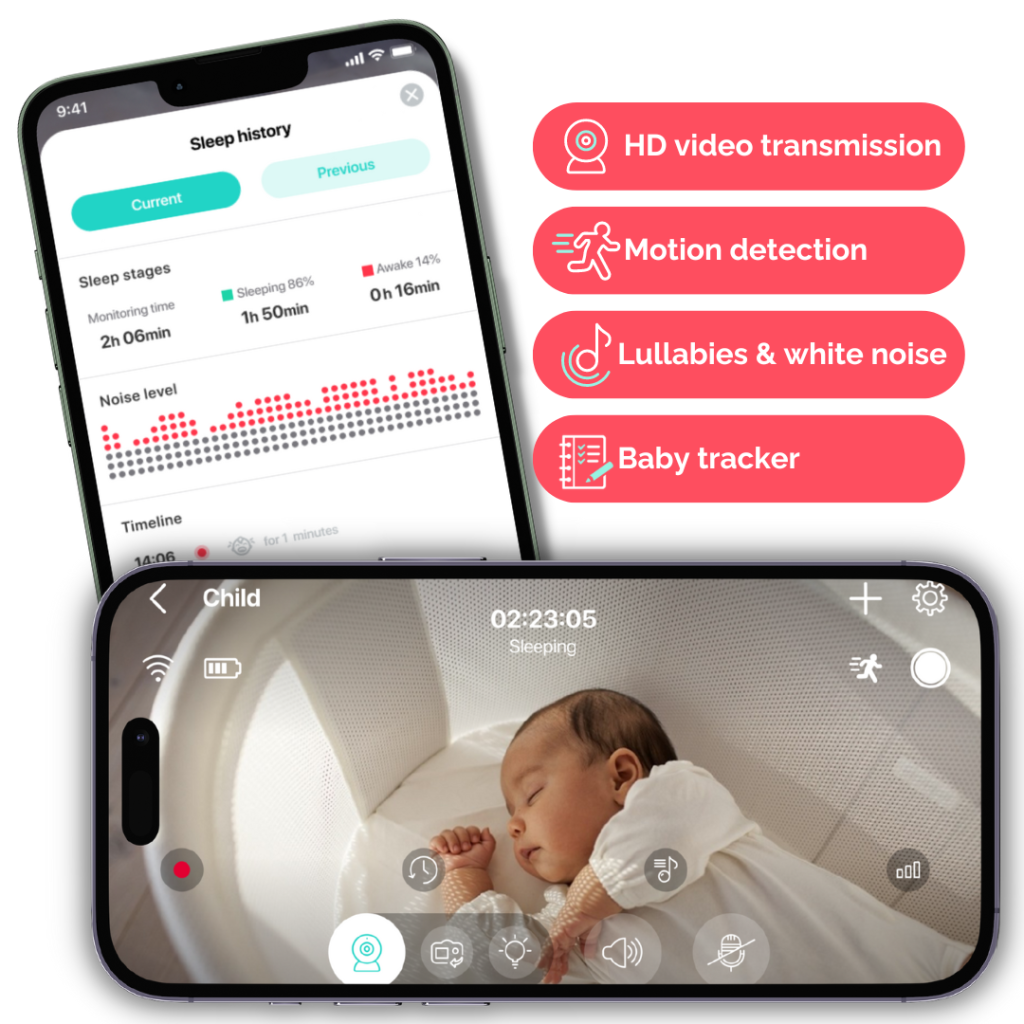
8-Month Sleep Regression Unraveled: Practical Solutions For Restful Nights
- Created:
10. 8. 2023 - Updated:
7. 2. 2024
Get this:
As babies grow, they often experience significant developmental changes. At 8 months, these changes are drastic and typically come with some challenges like sleep regression.
However:
This regression plays a vital role in your baby’s growth, marking important cognitive and physical milestones. It also signifies increased mobility and brain development, so you have nothing to worry about!
Fortunately:
This article will equip you with effective strategies to tackle the 8-month sleep regression.
Let’s begin.
What Is the 8-Month Sleep Regression?
Listen:
The 8-month sleep regression is a temporary disruption in an infant’s sleep patterns that typically occurs around the age of 8 months. During this period, babies start experiencing difficulties with falling asleep, staying asleep, or both.
They may wake up frequently during the night or have shorter sleep cycles.
Admittedly:
This regression can be challenging for both babies and parents, as it can disrupt established sleep routines and lead to exhaustion.
Nevertheless:
It reflects major milestones in a baby’s development and occurs at other times as well, from as early as 6 weeks.
Remember:
Every baby is unique, so the intensity and duration of sleep regressions vary from child to child.
But:
What really influences this sleep regression?
Causes of 8-Month Sleep Regression?
Several factors contribute to the 8-month regression in infants.
Good news:
By understanding these causes, parents and caregivers can navigate this phase better and support their baby’s sleep routine.
Here are some of the common causes of sleep regression in your 8-month-old baby.
1. Developmental Changes
Fact:
Around 8 months, babies often experience developmental milestones, such as learning to crawl, sitting up, and pulling themselves up.
Unfortunately:
The excitement and stimulation associated with these developmental changes can make it challenging for babies to fall asleep.
Additionally:
Their cognitive development progresses rapidly at this age. They become more aware of their surroundings, which can also disrupt their sleep routine.
2. Teething
According to MedlinePlus, babies often begin teething around 6 to 8 months.
Typically:
Symptoms of teething include increased drooling, irritability, and disrupted sleep patterns. The discomfort experienced by babies during teething contributes greatly to the 8-month sleep regression.
Luckily:
You can relieve teething pains in your 8-month-old by providing teething toys, rings, or gels. You can also massage your baby’s gums gently with a clean finger.
3. Separation Anxiety
Get this:
At 8 months, babies start developing stronger attachments to their parents or primary caregivers. This newfound bond often leads to separation anxiety.
Naturally:
They will experience separation anxiety when their parents aren’t around them, especially during bedtime. The fear of being alone makes it challenging for them to fall asleep, resulting in sleep regression.
In that case:
There are a couple of strategies you can consider to calm your baby’s anxiety. Some of these strategies include creating a calming environment and inducing self-soothing techniques to help the baby fall asleep independently.
4. Increased Environmental Awareness
As mentioned earlier:
At 8 months, babies become more cognitively aware of their surroundings. They become easily stimulated by external stimuli such as sound, light, or temperature.
Furthermore:
This increased awareness leads to heightened curiosity in babies and a desire to explore their environment. Their minds are actively processing new information, making it hard for them to fall asleep or maintain a deep sleep.

Signs and Symptoms of 8-Month Sleep Regression
By now, you should know that:
Sleep regressions are common occurrences as your baby grows; the 8-month sleep regression is no exception.
While every child may exhibit different signs, here are some common signs and symptoms associated with the 8-month sleep regression:
1. Waking up Frequently at Night
Your baby may suddenly start waking up more frequently during the night compared to their previous sleep routine. This can occur at random intervals and will require your attention.
Dealing with these frequent awakenings can be challenging and would often leave you sleep deprived.
However:
Sleep regressions are temporary and will fade off easily with the necessary measures put in place.
2. Heightened Fussiness
Generally:
Babies undergoing sleep regression may show increased fussiness, especially during bedtime.
Since they aren’t getting enough sleep, they cry more frequently or show irritation.
Additionally:
You may notice slight changes in your baby’s behavior. They may exhibit mood swings, become more clingy, or display signs of exhaustion, such as crankiness or difficulty focusing.
3. Restless Naps
Listen:
During the 8-month sleep regression, you will notice more tossing and turning in your baby’s sleep.
They may appear restless and will change positions frequently. It’s advisable to monitor your baby closely during this period to prevent Sudden Infant Death Syndrome (SIDS).
4. Change in Eating Pattern
Again, your baby might be going through sleep regression when you notice a change in appetite.
Some babies show less interest in feeding or don’t eat as much as they used to. Others may eat more and snack on almost anything, even at night. This, in turn, will have an adverse effect on their sleeping schedule.

Coping With 8-Month Sleep Regression
First off:
If your newborn is going through the notorious 8-month sleep regression, be rest assured that you’re not alone.
Note that:
This phase is temporary but could be very challenging. However, with the right strategies, you can go through it like a pro!
The best part:
You’re about to unlock the secrets to successfully navigating through this phase with the tips below.
Ready?
1. Consistent Bedtime Routine
Listen:
A consistent bedtime schedule helps notify and prompt your baby when it’s time to settle down and go to bed.
Thus:
Following the same routine each night can provide a sense of familiarity and comfort. You can include activities such as warm baths, story times, and singing lullabies.
In addition:
Maintain a predictable nap time routine. This helps to regulate their internal clock and promotes better sleep. However, be flexible and adjust the schedule if needed.
2. A Sleep-Friendly Environment
A conducive sleep environment has a lot of positive impacts on your baby. Avoid overstimulation close to bedtime and create a calm, relaxing sleep environment.
You can do this by:
Keeping the room dark, playing white noises or soft, soothing music, and maintaining optimal temperatures. You should also consider using blackout curtains to minimize external light and distractions.
Pro Tip:
A soothing white noise or soft music helps to drown out external noises and promote better sleep.
3. Pacifiers
If your baby uses a pacifier and finds it soothing, you can offer it during sleep times. According to the American Academy of Paediatrics, offering a pacifier at bedtime or naptime can help reduce the risk of SIDS.
Note:
Babies may become dependent on pacifiers for sleep, so it’s advisable to gradually wean them from them when they are ready.
4. Comfort and Reassurance
Now:
One of the most common causes of sleep regression is separation anxiety. At this age, babies begin to form bonds with their parents, so it’s hard for them to feel relaxed when you’re absent.
In that case:
You should offer comfort and reassurance by patting their back, singing softly, or cuddling them until they feel calm. Also, introducing self-soothing procedures helps improve your baby’s sleep.
Final Tip: Annie Baby Monitor – Your Baby Sleep Regression Solution Helper
If you’re dealing with the 8-month-old sleep regression and it’s getting tough, let Annie Baby Monitor help you out.
You can use its advanced features – baby tracker and sleep history – to keep an eye on your toddler’s sleep patterns and see how they’re changing. That way, you can adjust the sleep routine and give the little better sleep.
Say goodbye to sleep regression and embrace the power of Annie Baby Monitor.

Conclusion
Let’s summarize.
The 8-month sleep regression is a common phase characterized by disruptions in a baby’s sleep patterns. It can be caused by a variety of factors, some of which include increased environmental awareness, teething, and separation anxiety.
Note:
Every child is unique, so the signs experienced during the 8-month sleep regression may vary for each child.
Nevertheless:
Some common symptoms you should look out for are restless naps, heightened fussiness, mood swings, and appetite change.
Now:
Sleep regression is an important phase in your baby’s cognitive development and can not be prevented. Luckily, parents can make the phase a lot more bearable by:
- Sticking to a consistent bedtime routine.
- Providing comfort and a soothing sleep environment.
- Encouraging a regular sleep schedule.
Finally:
Keep in mind that sleep regressions are temporary and typically last for a few weeks. If you’re concerned about your baby’s sleep patterns or have any questions, consult your pediatrician for guidance.
Before you go:
Let us know if you found this article helpful. Feel free to share your suggestions and tips in the comment section below as well!
FAQ: 8-Month Sleep Regression
The signs of an 8-month sleep regression vary from child to child. However, the most common symptoms include increased nighttime waking, difficulty falling and staying asleep, and heightened separation anxiety. Some babies also exhibit signs of fussiness or irritability before bedtime and drastic change in appetite.
Parents can help their babies by establishing a consistent bedtime routine, providing a calm sleep environment, and offering extra comfort and reassurance. Additionally, parents should ensure that they maintain regular sleep and feeding schedules and consider sleep training methods suitable for their baby’s age and needs.
No. Sleep regressions are a natural part of a baby’s development and cannot be prevented. However, parents can establish healthy sleep habits early to help minimize the effects and make the regression period more bearable.






